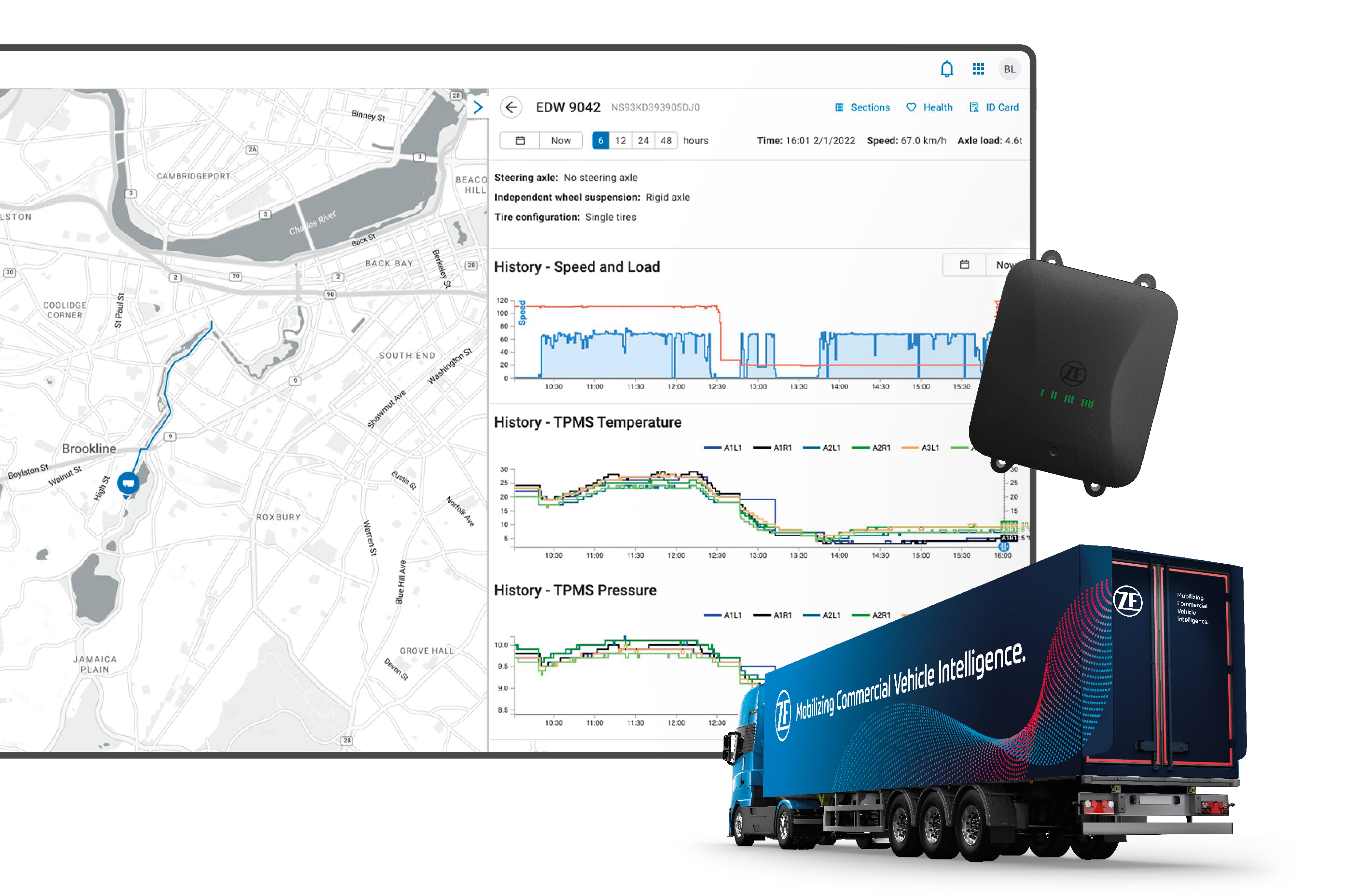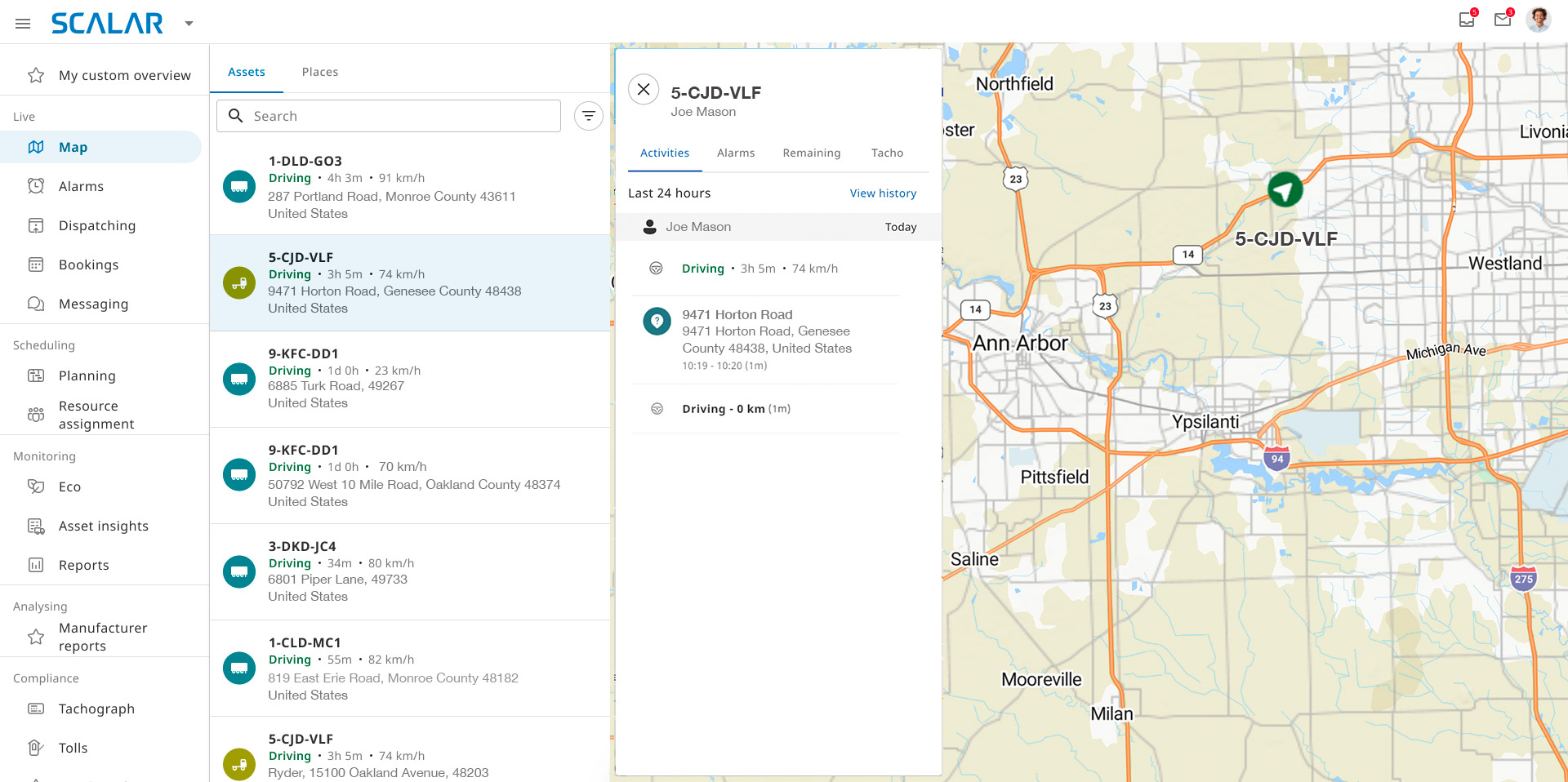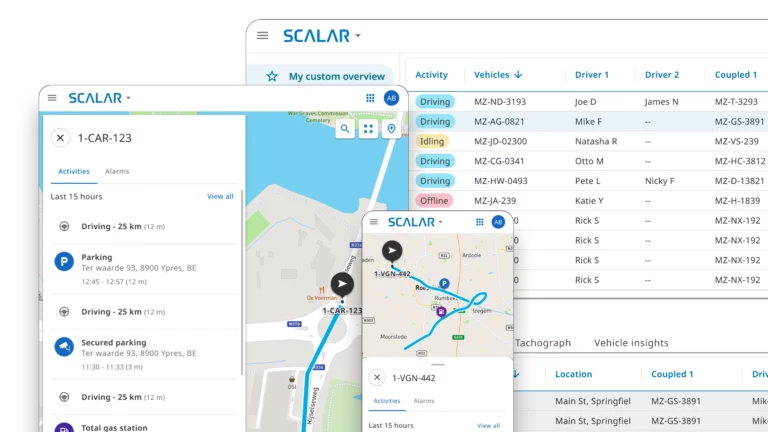In today’s fast-paced world, efficiency and safety are paramount in the commercial vehicle market. As technology continues to evolve, two innovative solutions have emerged to help optimize logistics and enhance supply chain management: smart trailers and trailer tracking systems (also known as track and trace). In this article, we’ll explain what a smart trailer is and how it compares to track and trace systems, uncovering the unique features and benefits of each to give you a clearer understanding of which solution may be the game-changer your fleet needs.
ZF offers a solution for both the smart trailer and trailer tracking system by leveraging a connectivity device, sensors, and a sophisticated user interface that visualizes vehicle information to help manufacturers and fleets enhance operational efficiency, increase uptime, and improve trailer utilization.
Imagine a trailer that is not just a cargo carrier but a proactive partner in your logistics operations. That’s the essence of a smart trailer. It goes beyond traditional tracking devices and provides fleet operators with a wealth of insights that they can use to make informed decisions about operations and logistics management.
Unlike conventional trailers, smart trailers are equipped with an array of sensors and a telematics device that delivers critical information remotely, enabling a smart and connected trailer. This empowers the trailer to communicate and analyze critical asset insights throughout its journey, including traditional track and trace features like GPS location, speed, and mileage, as well as wheel-end health, cargo load management, diagnostic fault codes, door sensors, light-out detection and much more.
Intelligent, connected trailers are outfitted with an array of sensors that provide insights into not only speed and location, but also braking, wheel-end, and lighting systems. These sensors provide fleet managers with critical metrics about a trailer’s health and help to ensure the cargo integrity.
A few examples of ZF’s sensor data capabilities include:
ABS Fault Codes – ZF delivers ABS fault codes through telematics, providing diagnostics information remotely, so fleet operators can quickly schedule service maintenance with the closest dealer that has the serviced parts in stock.
Tire Pressure – Our TPMS (tire pressure monitoring system), OptiTire, provides an untethered RF connection to our telematics device displaying real time tire temperature and pressure, whether the trailer is parked or moving.
Axle Load – ZF uses an aggregate axle load sensor to measure the cumulative axle, trailer, and cargo weight, providing fleets with real time trailer load status and capacity.
Third-Party Integration – We take an agnostic approach to hardware and software integration. We partner with third parties to integrate their sensor information and API (application programming interface) data into our own user interface. ZF also provides third party service providers with the option to integrate ZF’s sensor data via API.
The influx of data and analytics generated by smart trailers empowers fleet managers to make informed decisions now and in the future. From utilizing real-time ABS fault code data, to tracking deliveries and optimizing loading processes based on cargo weight, this technology helps streamline operations and minimize costly errors.
Smart trailer telematics incorporates advanced security features like geofencing, untethered trailer status, and door ajar sensors to help enhance cargo security. Geofencing alerts fleet managers when a trailer deviates from its designated route or if there is any unauthorized movement, while door ajar sensors notify fleets of improperly closed doors, helping reduce the risk of cargo theft and damage.
Smart trailers are not just about real-time data; they can also predict maintenance needs based on sensor readings through AI technology. By anticipating potential issues based on intelligent trailer features, fleet managers can schedule maintenance proactively, helping to minimize downtime and reduce maintenance costs.

Trailer tracking systems rely primarily on GPS technology to provide the real-time location of trailers, helping fleet managers monitor the whereabouts of their assets. This data is transmitted through cellular networks to a data center, allowing fleet managers to access location information remotely, to aid in route planning, delivery estimations, and overall coordination.
While track & trace systems provide location data, they often lack the comprehensive range of sensor data found in smart trailers. As a result, they may not offer insights into cargo conditions or potential maintenance needs.
Track and trace technology can send alerts to fleet managers when certain events occur, such as leaving or entering a designated area using geofencing technology.
Trailer tracking systems offer a high level of visibility into the supply chain, enabling businesses to proactively address delays or disruptions and enhance customer satisfaction. When a trailer's location is accurately known, it becomes easier to manage customer expectations and maintain transparent communication.


Now that you have a clearer picture of both technologies, let’s compare the main differences:
Smart trailers provide a comprehensive view of a trailer's environment and health, making them ideal for transporting sensitive or high-value cargo that requires real-time monitoring and the assurance the trailer is ready to make the trip. Track & trace systems, while effective in tracking location, may not offer the same depth of insights into trailer conditions.
Smart trailers may require a larger upfront investment due to the additional sensors required, but their potential for return on investment (ROI) by helping to optimize operations is substantial. Additionally, smart trailer technology offers a higher degree of customization, allowing fleet managers to outfit their trailer to meet their specific needs. Track & trace systems, being more standardized, can be more cost-effective for businesses primarily focused on real-time location tracking, though they have limitations on the trailer data they can monitor.
Smart trailers take a proactive approach to fleet management by predicting maintenance needs and reporting metrics using real-time trailer data. This allows fleet managers to act preventively and help avoid costly breakdowns. Track & trace systems, on the other hand, are more reactive, as they only focus on real-time tracking and do not provide insights into any other features such as ABS fault codes, wheel end or lighting conditions.
Smart trailer telematics and trailer tracking systems each bring their own set of advantages to the table. For businesses seeking to stay ahead in the competitive landscape, investing in ZF’s smart trailer technologies may prove to be a profitable upgrade. Intelligent, connected trailers help enhance efficiency, reduce operational costs, and provide a higher level of cargo security, making them an asset in the ever-evolving world of logistics.
Ultimately, the decision boils down to your specific needs and organizational goals. Whether you are looking to only track your trailer, or you are seeking the ultimate end-to-end solution for trailer and cargo health visibility, ZF provides a suite of solutions that can help support you.


0
EMEA
Americas
APAC
India